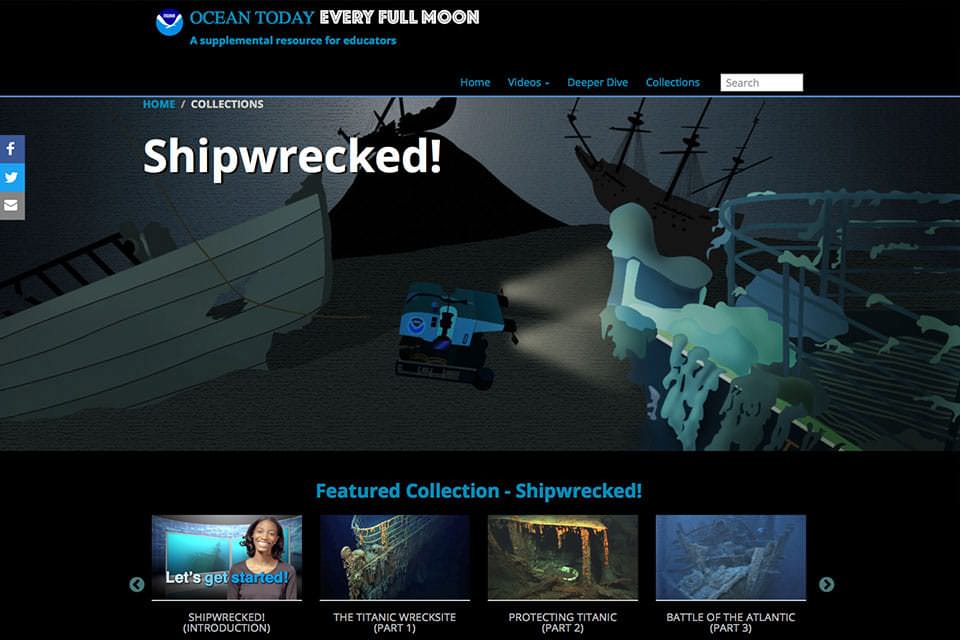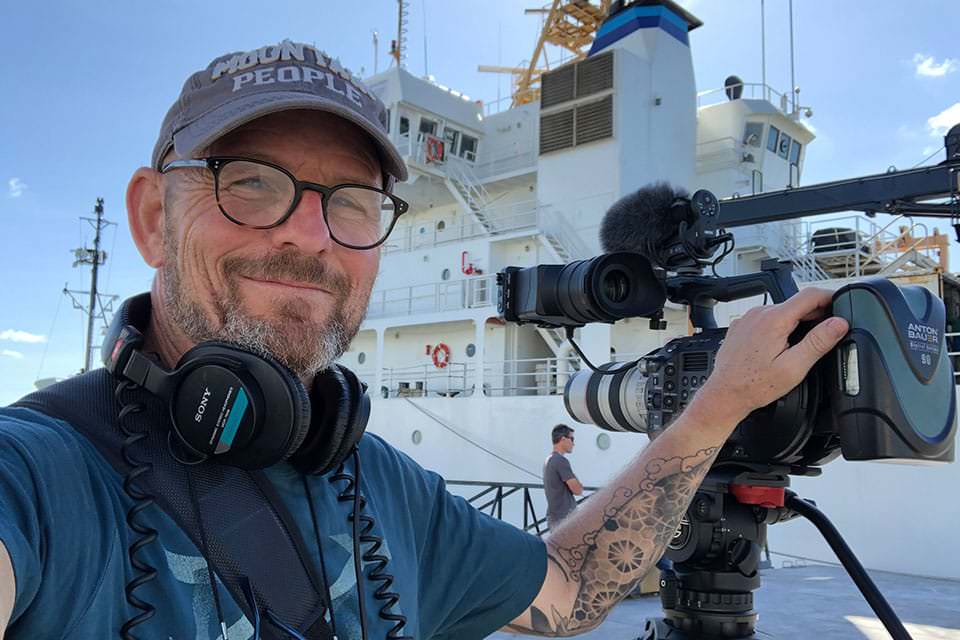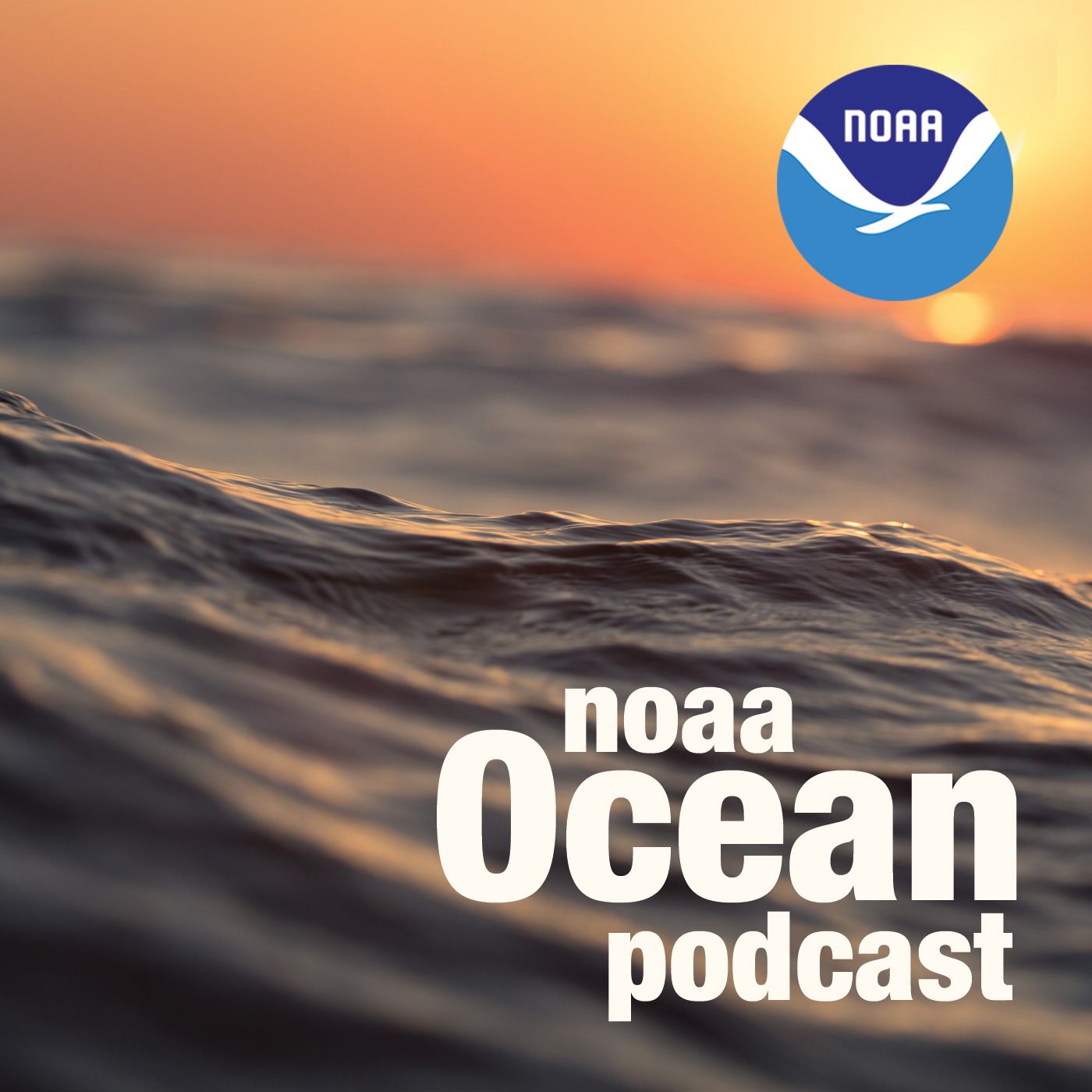Explore Your Ocean with NOAA Ocean Today
March 4, 2021
NOAA Ocean Podcast: Episode 44
Let's dive into the ocean! NOAA Ocean Today offers more than three hundred exciting, scientifically vetted short videos on topics ranging from deep sea exploration to climate change to marine life. Visit Ocean Today online, participate in a monthly 'Full Moon' live online show, or visit one of the many Ocean Today interactive kiosks located in museums, aquaria, and zoos around the world. Kurt Mann, Ocean Today Executive Producer and filmmaker, joins us to tell us all about this program.

NOAA Ocean Today features videos on all aspects of the ocean realm — exploration, discoveries, marine life, and science.
Transcript
[Excerpt from the 'Trash Talk' NOAA Ocean Today video] “We love the ocean. And when you love something, you want to protect it. Unfortunately, the ocean is being filled with trash. And people all over the world who care about the health of the ocean are doing something about it.”
HOST: This is the NOAA Ocean Podcast, I’m Troy Kitch. That was the beginning of Trash Talk, a video about marine debris. It’s one of more than three hundred videos available from NOAA’s Ocean Today … on topics ranging from marine life, to deep sea exploration, to climate change, to aquaculture, beach safety, tsunamis … there is something for everyone here. Oceantoday.noaa.gov is where to go for a ton of free, fantastic ocean videos that you can watch from home, but today you’re going to hear why it’s much more than that. We’re joined by Kurt Mann, Executive Producer of NOAA’s Ocean Today program. Two quick housekeeping notes before we begin: First, you’re going to hear Kurt mention a newsletter you can sign up for to be notified of upcoming webinars and videos. You’ll find that link in our show notes. And second, we recorded our conversation over a tempermental internet connection, so you may notice some digital blips and other minor audio weirdness during our talk. Kurt thanks for joining us. So we heard a small sample of Trash Talk at the beginning of the episode. Tell us a bit about this.

Kurt Mann, Ocean Today Executive Producer, filming on the NOAA Ship Ronald H. Brown.
KURT MANN: “Marine debris is a big issue. And we developed a six-part series called Trash Talk, that actually won a regional Emmy award, and it takes you through the process of understanding what is marine debris, what is the science behind how marine debris is impacting the animals of the ocean, the habitats of the ocean, and maybe even people, and then we talk about what you can do about it.”
HOST: So what’s your role in creating NOAA ocean today videos?
KURT MANN: “My job is to work with the amazing team we have here at NOAA to develop videos that spark curiosity and wonder with our audience. We focus on ocean literacy, what’s happening in the ocean, and our interaction with the ocean. So I’m learning something new every single day and I think one of the most interesting and fun aspects of my job is to figure out how to take complex science, create short videos — you know, they could be one to three minutes long — that simplify the science and then integrate some fun and exciting aspects of how those are presented. Because I’m convinced that if they’re not fun to watch and engaging and highly professional, it won’t draw as many people or draw them in to the excitement of everything that’s happening in the ocean.”
HOST: Aside from the topic of marine debris which you’ve told us about, what other kinds of videos people can expect to find at oceantoday.noaa.gov?
KURT MANN: “Sometimes we forget that we live on a water planet. If you are looking at Earth from space, what do you see? It’s blue. And it’s hard to get to the ocean sometimes, and it’s especially hard to get into the deep ocean. This is one of the most exciting types of videos that we produce, it’s deep ocean exploration. We have robots, remotely operated robots, with high quality video cameras, that go into the deepest parts of the ocean and explore what’s there, document what’s there, what might need to be saved. Sometimes, they even find shipwrecks in the deep ocean. We have an entire collection around shipwrecks. Some of this video is even streamed live from the ship that is out in the ocean, and Ocean Today — we capture that footage and we find the best bits and we produce short videos around it. It’s almost impossible not to be amazed by the life that we are discovering in the deep ocean. Some of the creatures down there look like they’re from another world. And so Ocean Today helps kids understand the details about what’s happening down there — and discoveries. Eleven, twelve years ago they discovered hydrothermal vents — it’s this boiling hot water that’s emerging out of the depths of the Earth, and they found life there. Scientists did not believe that life could live in such an extreme environment, and that discovery has led to a collaboration with NASA to explore planets in our universe. And so those kinds of interactions and engagements and discoveries are the core of the content we produce at Ocean Today.”
HOST: Sounds like great videos for kids.
KURT MANN: “Absolutely, every time we produce a video I am thinking of that 14-year-old inside me that is curious and learning about the world, but are also just as useful for anybody who has an interest or curiosity around the ocean and are looking for video content that is scientifically vetted and scientifically focused. So anyone can enjoy these videos. Often, the video documentary television shows that are focused on something like the ocean are really dramatic and designed to attract as many people to watch as people. We have the same intention. I think if you go and watch a couple videos, you’re going to have a hard time not loving them. We put a lot of work into that. But it is primarily focused on middle school kids and the general public.”
HOST: Can you talk a bit more about how the videos are scientifically vetted and focused?
KURT MANN: “Yes, I think one of the aspects that are critical to understand about the Ocean Today videos is that we work with subject matter experts here at NOAA. These are scientists that are expert in their field. And through the production process and the script writing, we go through multiple script versions to make sure we get the science right.”
HOST: Is oceantoday.noaa.gov the only place where people can see all of these videos?
KURT MANN: “In addition to the website, we have a kiosk network which started back in 2008 at the Smithsonian American Museum of Natural History in Washington DC. That kiosk network has grown from an initial five or six locations in museums, aquaria, zoos, to now 34 throughout the country and other parts of the world.”
HOST: We’ve talked about how some videos are presented in multi-part collections. I was browsing through the site in preparation for our talk and saw that videos are also organized so people can casually browse by topics of interest. Are there any other ways that you offer to showcase what’s available from Ocean Today?
KURT MANN: “An ongoing program that we have that attracts a lot of people is the Ocean Today Every Full Moon Watch Party. This is a live webinar that we produce every full moon, unless the full moon is on a Saturday, and then we might have it on a Monday. But the idea behind this is that we want folks to be thinking about the fact that we live in space. We are a planet floating through space, and we happen to have a moon that shows up in the sky once a month. And that moon is a phenomenon that everyone on the planet experiences. And the moon also has a pretty dramatic effect on the ocean. So we thought that the full moon would be a really cool time to all come together and share stories about the ocean. And this is also a great resource for teachers who are wanting to preview a particular topic, and they want to go in depth, or they want to learn a little bit more about some of the videos that Ocean Today might feature around a topic. So, for example, on of the more exciting topics that we had this last year was called Ocean Worlds and it was a program about how NOAA and NASA are working together to search for life on other ocean planets. And it was an amazing to show how NASA scientists were working with oceanographers to understand what does it take to collect samples or to dive deep into the ocean and do it successfully. NASA is pretty convinced that there is a high probability that life is existing on, let’s say the moon Europa. And the scientists talked about how they came up with that idea to go and explore the moon of Europa. And it was because of the discoveries that had been made by ocean explorers 11 or 12 years ago, where they discovered hydrothermal vents. And they got into the details of it. It was a fascinating, fascinating show. So each month we have a different topic, we invite people to participate. And then the webinars are archived and then divided into sections. So these one hour programs are divided into three twenty minute sections. And of course, we have all the links and resources. So sign up for the newsletter, we’ll let you know what’s coming the next full moon.”
HOST: So these webinars are sort of like monthly TV shows.
KURT MANN: “Absolutely. I mean, this is not a PowerPoint webinar. This show, this has an opening, this has videos that we play within the webinar and we try to make it as evergreen as possible. Often teachers will tell us, hey we’d like to learn a little bit more about the kinds of videos you have, but if the videos are just on the website and don’t have any context, sometimes it’s not that useful for the teacher. But a teacher can go to one of these webinars and watch either the full webinar or one of the individual segments and say, ‘oh wow, this is a topic that I want to assign to my kids.’”
HOST: What are you working on now? What can people look forward to in the coming months?
KURT MANN: “We’re working on a series right now, we’ve been filming in Charleston, South Carolina at a middle school there that, when the tides are high, the water literally laps up to their front door. And dropping off kids in the middle of the water. So we might talk about sea level rise and its impact, but we’re going to talk about the science too. Why is it happening? We might talk about how a warmer planet is expanding the ocean, expanding the volume of the water of the ocean. In the process of researching these scripts, we decide what are the most important parts that people can take with them, so that they can integrate with their community and work together with their friends and groups to help improve the situation.”
HOST: I look forward to the new series. It’s got to be really interesting to work on all of these projects — there’s certainly a lot of different topics to cover for something as vast our ocean.
KURT MANN: “Every day, as I’m writing scripts or filming on location, talking to scientists, I’m amazed by the complexity of the ocean and how much we don’t know about it, but how much we are learning about it. And ultimately, video is a visual technique, and the ocean is a beautiful place. I grew up on the Gulf of Mexico in Sarasota, Florida, and it influenced me in ways that I can’t even completely understand. But I want to be able to share that enthusiasm. Our team works really hard to make the videos beautiful and inspiring, but also the scientists at NOAA are working really hard to provide the information that make important decisions, but we get see some really amazing things. And that’s why I would encourage people to come and check out Ocean Today. You can easily spend, you know, an hour going from video to video to video … learning something along the way.”
HOST: Kurt Mann, Executive Producer for NOAA’s Ocean Today, thank you so much for joining us to tell us a bit about this program. And once again, you can find it all online at oceantoday.noaa.gov … there are monthly webinars, new videos coming all the time, and a network of hands-on kiosks around the world. And you can find our show notes and a transcript of this episode on our website at oceanservice.noaa.gov. Look for the podcast tab, you can’t miss it. Thanks for listening to the NOAA Ocean Podcast.

From corals to coastal science, connect with ocean experts to explore questions about the ocean environment.
Social